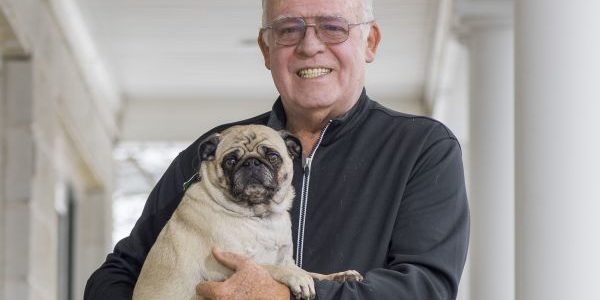 Gerald Buckley couldn’t tell you much about his prostate cancer treatments at Precision CyberKnife of New York, except that they were easy and painless. “Talk about not hurting or being invasive!” he said. “I fell asleep during four of the five treatments when they put the headsets on and played country music. I was laying there for 45 minutes and went right to sleep.”
Gerald Buckley couldn’t tell you much about his prostate cancer treatments at Precision CyberKnife of New York, except that they were easy and painless. “Talk about not hurting or being invasive!” he said. “I fell asleep during four of the five treatments when they put the headsets on and played country music. I was laying there for 45 minutes and went right to sleep.”
And following each of his five treatments over a two-week period, during which the father of three and grandfather of seven said he did not experience any discomfort or pain, “I could do anything I wanted. It didn’t put me down or put me out at all. I still did all the same things. I’d go to the beach. I’d read the newspaper. I’d go out to see the grandchildren. Nothing changed.”
Gerald, 69, learned that he had prostate cancer after a visit to his doctor and routine blood tests. “For the longest time, my PSAs were okay and then they started to go up,” he said.
Prostate-specific antigen, or PSA, is a protein produced by cells of the prostate gland. A PSA test measures the level of PSA in a man’s blood, and the blood level of PSA is often elevated in men with prostate cancer.
Gerald saw urologist Albert Kim, MD, who did a biopsy and determined Buckley had prostate cancer.
“When I was diagnosed with prostate cancer my doctor offered several different treatment options, and a friend of mine who went through Precision CyberKnife a year earlier said it was easy and good,” he said. “When I went back to my doctor, I said I wanted to try Precision CyberKnife and he said I was a good candidate.”
At Precision CyberKnife, a program of Mather Hospital at New York Cancer and Blood Specialists, Gerald spoke with radiation oncologist Martin Silverstein, MD.
“I’ve been a practicing radiation oncologist for more than 25 years. I’ve seen great advances in radiation technology. Precision CyberKnife is one of the most amazing breakthroughs in radiation delivery that I’ve seen in my career,” said Silverstein.
“I would recommed Precision CyberKnife because it was a very good experience and it did what it was supposed to do. It was a much better experience than I thought it would be and the people were great there,” said Gerald.
Since his treatments, Gerald’s PSA levels have continued to decline. “I’m looking forward to the PSAs continuing to go down and that’s what my doctor expects,” he said.

